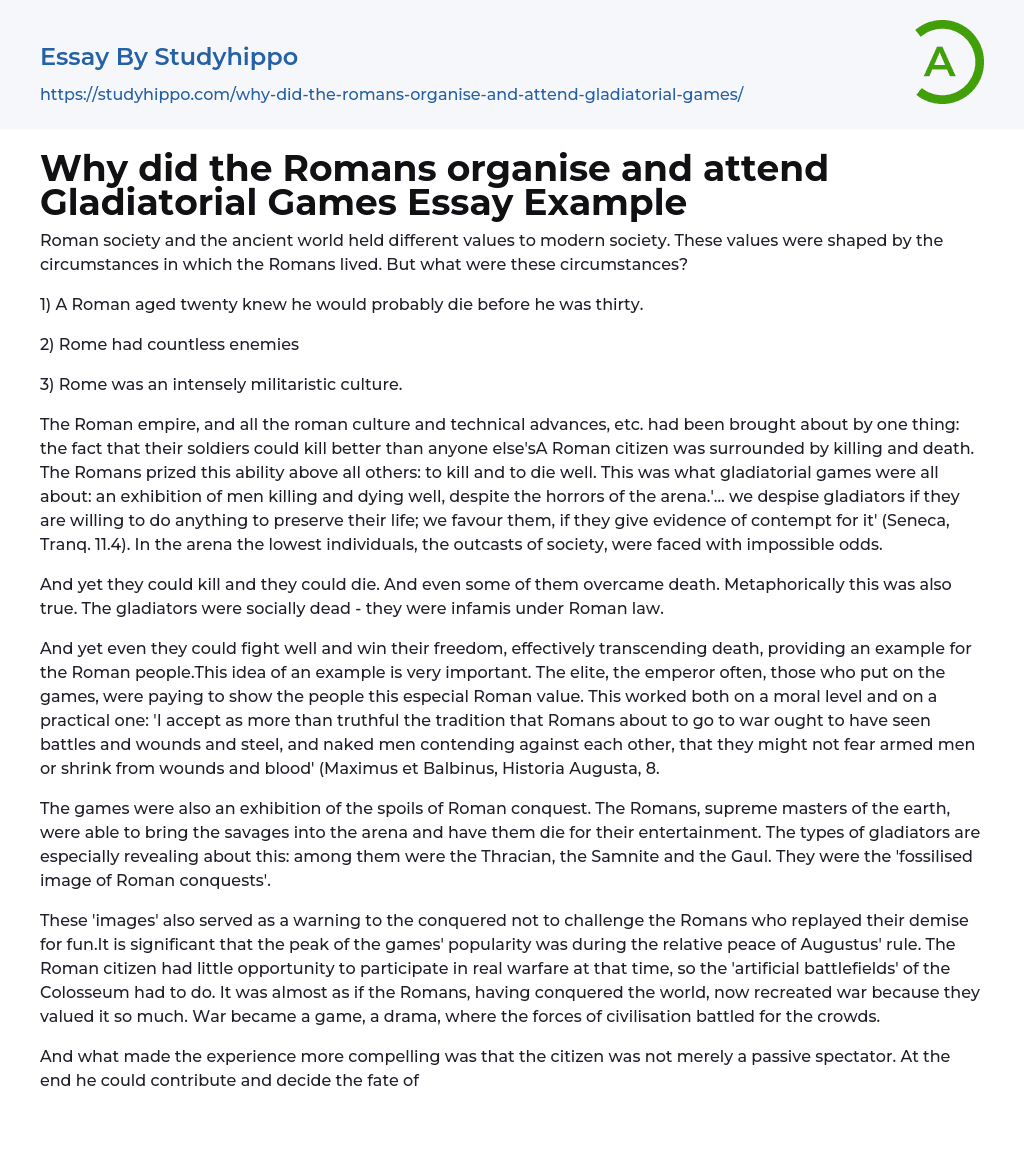

Why did the Romans organise and attend Gladiatorial Games Essay Example
Roman society and the ancient world held different values to modern society. These values were shaped by the circumstances in which the Romans lived. But what were these circumstances?
1) A Roman aged twenty knew he would probably die before he was thirty.
2) Rome had countless enemies
3) Rome was an intensely militaristic culture.
The Roman empire, and all the roman culture and technical advances, etc. had been brought about by one thing: the fact that their soldiers could kill better than anyone else'sA Roman citizen was surrounded by killing and death. The Romans prized this ability above all others: to kill and to die well. This was what gladiatorial games were all about: an exhibition of men killing and dying well, despite the horrors of the arena.'... we despise gladiators if they are willing to do
...anything to preserve their life; we favour them, if they give evidence of contempt for it' (Seneca, Tranq. 11.4). In the arena the lowest individuals, the outcasts of society, were faced with impossible odds.
And yet they could kill and they could die. And even some of them overcame death. Metaphorically this was also true. The gladiators were socially dead - they were infamis under Roman law.
And yet even they could fight well and win their freedom, effectively transcending death, providing an example for the Roman people.This idea of an example is very important. The elite, the emperor often, those who put on the games, were paying to show the people this especial Roman value. This worked both on a moral level and on a practical one: 'I accept as more than truthful the tradition that Romans about to go to war
ought to have seen battles and wounds and steel, and naked men contending against each other, that they might not fear armed men or shrink from wounds and blood' (Maximus et Balbinus, Historia Augusta, 8.
The games were also an exhibition of the spoils of Roman conquest. The Romans, supreme masters of the earth, were able to bring the savages into the arena and have them die for their entertainment. The types of gladiators are especially revealing about this: among them were the Thracian, the Samnite and the Gaul. They were the 'fossilised image of Roman conquests'.
These 'images' also served as a warning to the conquered not to challenge the Romans who replayed their demise for fun.It is significant that the peak of the games' popularity was during the relative peace of Augustus' rule. The Roman citizen had little opportunity to participate in real warfare at that time, so the 'artificial battlefields' of the Colosseum had to do. It was almost as if the Romans, having conquered the world, now recreated war because they valued it so much. War became a game, a drama, where the forces of civilisation battled for the crowds.
And what made the experience more compelling was that the citizen was not merely a passive spectator. At the end he could contribute and decide the fate of the outcasts of his society. The experience at the games was clearly structured and symbolic of the ideal Roman society. The Emperor sat at the front, and the most important people were closest to the killing. The women sat at the back, humbly watching the exhibition of what their men had conquered.
- Ancient Rome essays
- Augustus essays
- Byzantine Empire essays
- Julius Caesar essays
- Mark Antony essays
- Roman Republic essays
- 12 Angry Men essays
- A beautiful mind essays
- A Separation essays
- Alfred Hitchcock essays
- American Beauty essays
- American Films essays
- Animation essays
- Avatar essays
- Blade Runner essays
- Bollywood essays
- Bond essays
- Bridge essays
- Cinema Of The United States essays
- Comedies essays
- David essays
- Dead Poets Society essays
- Do The Right Thing essays
- Documentary essays
- English-Language Films essays
- Erin Brockovich essays
- Film Analysis essays
- Film Editing essays
- Film Noir essays
- Film Techniques essays
- Finding Forrester essays
- Forrest Gump essays
- Gattaca essays
- Gladiator essays
- Glory essays
- Good Will Hunting essays
- Hamilton essays
- Hollywood essays
- Horror essays
- Jaws essays
- King kong essays
- Like Water For Chocolate essays
- Looking For Alibrandi essays
- Martin Scorsese essays
- Melodrama essays
- Monster essays
- Moulin rouge essays
- Movie Analysis essays
- Movie Review essays
- On The Waterfront essays



